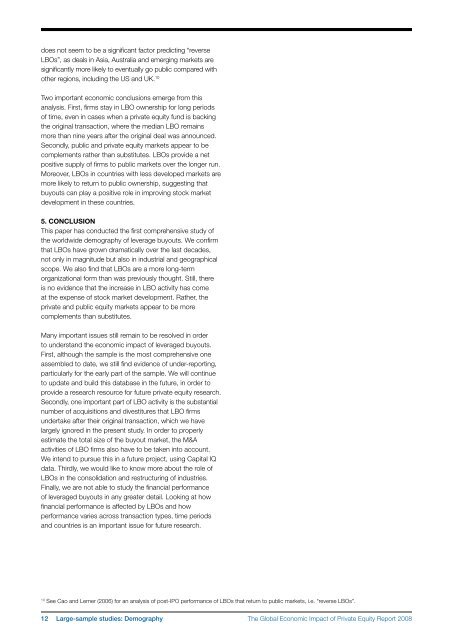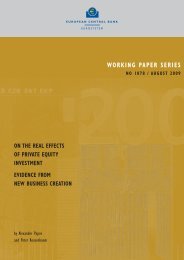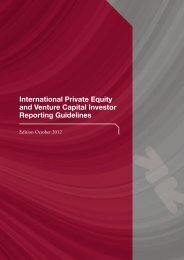The Global Economic Impact of Private Equity Report 2008 - World ...
The Global Economic Impact of Private Equity Report 2008 - World ...
The Global Economic Impact of Private Equity Report 2008 - World ...
- No tags were found...
You also want an ePaper? Increase the reach of your titles
YUMPU automatically turns print PDFs into web optimized ePapers that Google loves.
does not seem to be a significant factor predicting “reverseLBOs”, as deals in Asia, Australia and emerging markets aresignificantly more likely to eventually go public compared withother regions, including the US and UK. 10Two important economic conclusions emerge from thisanalysis. First, firms stay in LBO ownership for long periods<strong>of</strong> time, even in cases when a private equity fund is backingthe original transaction, where the median LBO remainsmore than nine years after the original deal was announced.Secondly, public and private equity markets appear to becomplements rather than substitutes. LBOs provide a netpositive supply <strong>of</strong> firms to public markets over the longer run.Moreover, LBOs in countries with less developed markets aremore likely to return to public ownership, suggesting thatbuyouts can play a positive role in improving stock marketdevelopment in these countries.5. ConclusionThis paper has conducted the first comprehensive study <strong>of</strong>the worldwide demography <strong>of</strong> leverage buyouts. We confirmthat LBOs have grown dramatically over the last decades,not only in magnitude but also in industrial and geographicalscope. We also find that LBOs are a more long-termorganizational form than was previously thought. Still, thereis no evidence that the increase in LBO activity has comeat the expense <strong>of</strong> stock market development. Rather, theprivate and public equity markets appear to be morecomplements than substitutes.Many important issues still remain to be resolved in orderto understand the economic impact <strong>of</strong> leveraged buyouts.First, although the sample is the most comprehensive oneassembled to date, we still find evidence <strong>of</strong> under-reporting,particularly for the early part <strong>of</strong> the sample. We will continueto update and build this database in the future, in order toprovide a research resource for future private equity research.Secondly, one important part <strong>of</strong> LBO activity is the substantialnumber <strong>of</strong> acquisitions and divestitures that LBO firmsundertake after their original transaction, which we havelargely ignored in the present study. In order to properlyestimate the total size <strong>of</strong> the buyout market, the M&Aactivities <strong>of</strong> LBO firms also have to be taken into account.We intend to pursue this in a future project, using Capital IQdata. Thirdly, we would like to know more about the role <strong>of</strong>LBOs in the consolidation and restructuring <strong>of</strong> industries.Finally, we are not able to study the financial performance<strong>of</strong> leveraged buyouts in any greater detail. Looking at howfinancial performance is affected by LBOs and howperformance varies across transaction types, time periodsand countries is an important issue for future research.10See Cao and Lerner (2006) for an analysis <strong>of</strong> post-IPO performance <strong>of</strong> LBOs that return to public markets, i.e. “reverse LBOs”.12 Large-sample studies: Demography<strong>The</strong> <strong>Global</strong> <strong>Economic</strong> <strong>Impact</strong> <strong>of</strong> <strong>Private</strong> <strong>Equity</strong> <strong>Report</strong> <strong>2008</strong>















